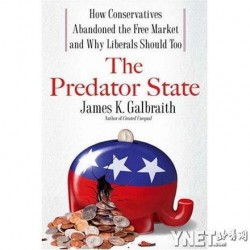Book review by Charles Zhu – Beijing Today, 14 November 2008
The website of “Beijing Today” is now officially a dangerous “attack website”! Went there anyway and had to correct several mistakes in the article. The site is still pretty lousy.
I won’t buy the book but the review is interesting. Read for yourself.
Good to refresh the memory of some here:
Paulson 20 July: “It’s a safe banking system, a sound banking system. Our regulators are on top of it. This is a manageable situation”.
Or better, in May: “The worst is likely behind us. There is no doubt that things feel better today, by a lot, than they did in March”. “Looking forward, I expect that financial markets will be driven less by the recent turmoil and more by broader economic conditions and, specifically, by the recovery of the housing sector”.
Yeah, those silly people like Soros and Buffett.
Took some time for the Bush incompetents to “admit” there were some problems. Maybe the regulators were on holiday?

People today are fairly impressed by the foresight of George Soros in his book “The New Paradigms for the Financial Markets”, published by PublicAffairs. As early as last May he wrote, “We are in the midst of a financial crisis the likes of which we haven’t seen since the Great Depression.” Soros said that the financial system, as it currently operates “is built on false premises”. Unfortunately, we have an idea of market fundamentalism, which is now the dominant ideology, holding that markets are self-correcting. All five big investment banks – Bear Stearns, Merrill Lynch, Lehman Brothers, Goldman Sachs and Morgan Stanley – disappeared or morphed into regular banks. Stock market indexes fell. People are increasingly concerned with the financial market, and in this investment climate, a voice that echoes some of Soros’s ideas is quite enlightening. That voice booms forth from The Predator State: “How Conservatives Abandoned the Free Market and Why Liberals Should Too” (Free Press), written by James K. Galbraith, an economist at the University of Texas and son of economist John Kenneth Galbraith, “the last American Institutionalist.”
In Predator State, Galbraith criticizes everything many hold up as the virtues of private markets. He says the Reagan Revolution and all its ensuing years was a fraud. What remains of its swindle? The answer, he says, is nothing: no one save for the academics fall for it anymore.
Galbraith maintains that the Reagan Revolution was based on three presumptions: deregulation, monetarism and low taxes. He says that deregulation is an artifice so that lobbyists can extract “more money from those who can afford to pay – and sometimes from those who cannot.”
Monetarism, in his idea, is a tool to counter labor unions and cope with Wall Street. The conservatives have blind faith in cutting taxes, thinking that it is the only way to save the market. The policy of low taxes did not achieve what it aimed to and failed to stimulate saving Americans. It was only a gift to the wealthiest 1% of the American population.
“It is fair to say that there will never again be any US government for which a truly principled conservative might work,” he says.Galbraith spares no efforts challenging tired conventions. He says inflation rose in the 1970s because the Federal government printed too much money and he laments that big companies, big unions and OPEC have too much pricing power.
As a devoted Keynesian, he says he believes in deficit spending and scoffs at liberals for adopting the ideal of balanced budgets just when the conservatives abandoned it. Those who believe in balanced budgets are not only mimicking conservatives, he says, but are mimicking dead ones. He disagrees with the liberal approach to trade protection, which demands that developing economies agree to reforms in their home countries. It is virtually impossible to do so as “you cannot impose a wage standard on China or Vietnam,” he says. The author endorses such policies as price controls and state planning. “You want higher wages? Raise them. You want more and better jobs? Create them,” he says In his opinion, the market as some exponents advocate does not exist. The market as they describe it, he argues, is but a vaporous idea, a cosmic and ethereal space, a negation and a non-state.